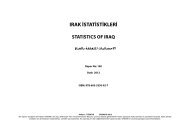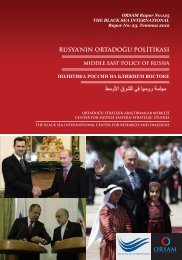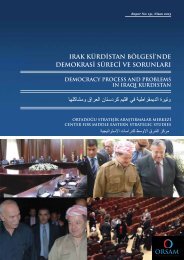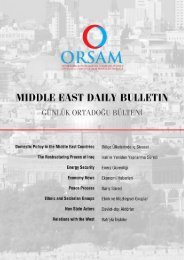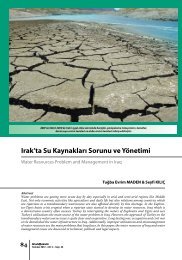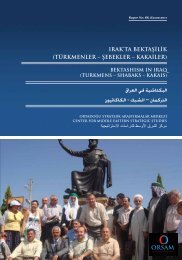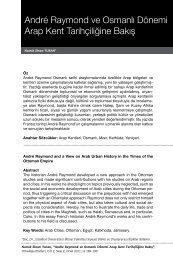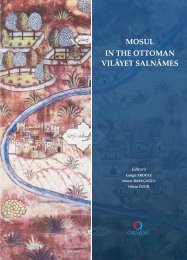turkmen in iraq and their flight - orsam
turkmen in iraq and their flight - orsam
turkmen in iraq and their flight - orsam
Create successful ePaper yourself
Turn your PDF publications into a flip-book with our unique Google optimized e-Paper software.
ORSAM-CENTER FOR THE MIDDLE EASTERN TURKMEN STUDIES<br />
Figure 20: Reasons for Migration<br />
<strong>and</strong> have kids. Married Turkmen migrants with<br />
kids often have two or more children (71%).<br />
Before migration abroad, only 17% of Turkmen<br />
had children. This is closely related to the fact<br />
that they were too young when they moved<br />
abroad <strong>and</strong> so did not have children.<br />
Mother language is Turkmen (99%) although<br />
less than one percent was reported that the<br />
language spoken at home when they were child<br />
was Arabic or Kurdish. Along with Turkmen, a<br />
dialect of Turkish, 95% of them can also speak<br />
Arabic, the official language of Iraq. English,<br />
Turkish, German, Kurdish, <strong>and</strong> Persian are also<br />
reported as third languages spoken by Turkmen<br />
migrants. S<strong>in</strong>ce it is very similar to <strong>their</strong><br />
mother language, Turkish (as spoken <strong>in</strong> Turkey)<br />
is also common among Turkmen although<br />
only a fraction of them mentioned Turkish as<br />
an additional language (10%). They also speak<br />
English (35%), an <strong>in</strong>ternational language. Kurdish<br />
<strong>and</strong> Persian are other local languages. So it<br />
is underst<strong>and</strong>able why these were also widely<br />
spoken by Turkmen. German is spoken most<br />
likely because most Turkmen migrants went to<br />
Germany.<br />
Migration did not br<strong>in</strong>g an improvement <strong>in</strong><br />
terms of education for 72% of them while about<br />
one <strong>in</strong> ten achieved a level upper <strong>in</strong> <strong>their</strong> education.<br />
However given that only a small fraction<br />
of Turkmen moved abroad for education, any<br />
educational ga<strong>in</strong> is underst<strong>and</strong>ably happened<br />
accidentally if it ever happened.<br />
For a large majority of Turkmen, migration<br />
was not a mean to l<strong>and</strong> <strong>in</strong> a job. Only 29% of<br />
them moved from unemployment <strong>in</strong>to jobs<br />
with migration while for 64% of them very little<br />
changed <strong>in</strong> terms of employment. Besides 6%<br />
of Turkmen became unemployed follow<strong>in</strong>g<br />
migration. However, as displayed <strong>in</strong> figure 21,<br />
before migration, 17% of Turkmen were unemployed<br />
which reduced to only 4% after migration<br />
while proportion of those <strong>in</strong> employment<br />
rose to 59% almost doubl<strong>in</strong>g those work<strong>in</strong>g<br />
prior to <strong>their</strong> migration abroad. In this sharp<br />
change, we can count <strong>in</strong> those who went abroad<br />
for education <strong>and</strong> on return as graduates, they<br />
took up jobs. However, this can only expla<strong>in</strong><br />
part of the shift. Consider<strong>in</strong>g the warfare environment<br />
of Iraq, it is not a surprise so many<br />
Turkmen stepped <strong>in</strong>to employment when they<br />
fled the country although they expressed that<br />
44<br />
www.<strong>orsam</strong>.org.tr




